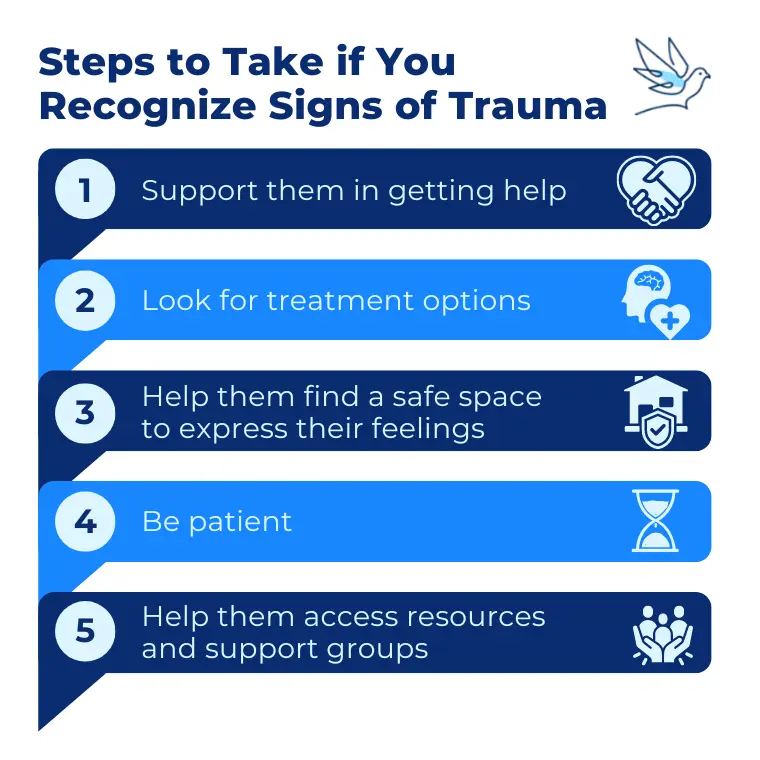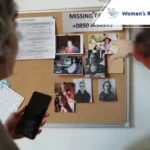Research indicates that survivors of human trafficking frequently face severe emotional challenges, such as depression, anxiety, and PTSD. These traumatic events often leave deep scars, affecting their daily lives long after the incidents have ended.
The signs of trauma can manifest in various ways, including distressing memories and feelings of unease. Unresolved trauma from these experiences can interfere with a person’s ability to lead a fulfilling life.
Recognizing these signs and understanding the support systems available is essential. In this guide, we’ll explore how to identify trauma and provide guidance on seeking help in California.
Common Signs of Trauma in Trafficking Victims
Trauma in victims of human trafficking can manifest in various ways, impacting both their mental and physical well-being. Recognizing these signs is essential to provide the right support and care. While the response to trauma can vary from person to person, certain patterns are commonly observed.
Below are key categories to help identify signs of trauma in trafficking victims.
Emotional and Mental Health Reactions
- A persistent sense of fear that makes everyday activities challenging.
- Intense negative emotions such as guilt, shame, or hopelessness.
- Severe anxiety that disrupts normal routines and interactions.
Physical Reactions
- Frequent physical complaints like headaches or digestive issues.
- Lack of coordination or balance, along with noticeable paleness.
- Fatigue or exhaustion that doesn’t improve with rest.
Behavioral Changes
- Avoidance of situations or people that remind them of the traumatic events.
- Sudden outbursts of anger or frustration, often triggered by seemingly minor issues.
- Withdrawing from social interactions or becoming isolated from friends and family.
Cognitive Effects
- Difficulty concentrating or maintaining focus.
- Memory lapses, particularly concerning the traumatic events.
- Persistent confusion or disorientation in familiar settings.

Trauma in Context: Trafficking in Hotels
According to the National Human Trafficking Resource Center (NHTRC), 1,434 cases of trafficking have been reported in hotels or motels, with 1,867 victims and survivors identified. Alarmingly, 92% of these cases involved sex trafficking.
Hotels and motels often become venues for trafficking due to their transient nature. This environment provides traffickers with a degree of anonymity and ease of access.
The ongoing trauma experienced by victims in these settings is profound. They are frequently exposed to events that can impact their well-being.
The effects of trauma in such settings are often compounded by the isolation and control exerted by traffickers. For survivors, these experiences can lead to long-lasting mental health issues that require specialized care and support.
Steps to Take if You Recognize Signs of Trauma
If you notice signs of trauma in someone, take steps to ensure they receive the support they need. Recognizing these signs early and seeking appropriate help can make a significant difference in their recovery journey. Here are some steps to consider:
- Encourage the individual to speak with a mental health professional who specializes in trauma.
- Look for trauma-focused treatment options that address specific needs, such as therapy for children and teens.
- Support them in finding a safe environment where they can express their feelings and experiences.
- Be patient and understanding, as trauma survivors may exhibit self-destructive behavior or relive the event through flashbacks.
- Help them access resources and support groups that offer guidance and connection with others facing similar challenges.

Legal Framework and Support Systems in California
The California Trafficking Victims Protection Act gives survivors the right to sue those who exploited them. This law protects everyone in California, regardless of their immigration status.
Additionally, Penal Code 236.1 makes it a crime to unlawfully restrict someone’s freedom for forced labor or services. Those convicted under this code may face prison sentences ranging from 5 to 12 years, along with fines up to $500,000.
For immediate help, survivors can contact the National Human Trafficking Resource Center at 1-888-373-7888. They can also seek legal assistance from the Women’s Rights Group in California for compensation and support.
Healing Starts Here
Understanding and addressing trauma is crucial for those affected by sex trafficking and other forms of exploitation. Traumatic events can lead to a range of mental health conditions, including emotional abuse and physical signs that are often overlooked.
Common reactions such as severe anxiety or flashbacks are important to recognize, especially in contexts like trafficking in hotels where ongoing trauma may occur. California’s human trafficking law provides critical protections and avenues for seeking justice, but survivors need trauma-informed care to truly heal.
For those seeking assistance, the Women’s Rights Group offers support, advocacy, and help in obtaining compensation and justice. To find out how we can help, reach out to us today.
Share this information to help spread awareness and support for survivors.






